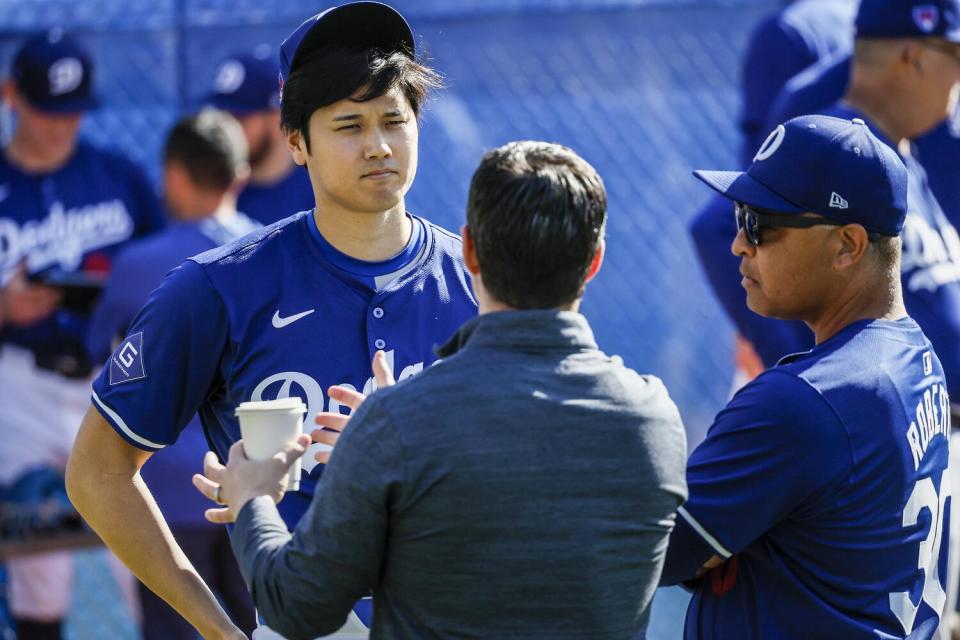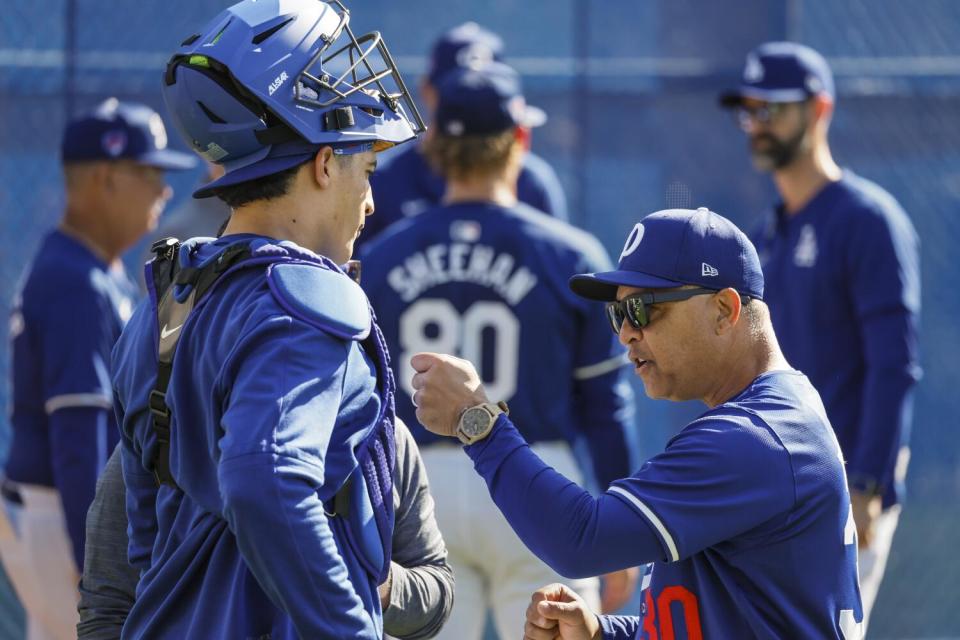He stands up at his spartan desk on a dull February morning and grins as if handed a gift.
“Dude this is so good, so much fun!” he says. “I can’t wait to get to work every day!”
He is asked if this could be the most difficult of his nine seasons, and answers as if leading a cheer.
“This will be the toughest, because anything short of winning a championship will be an underachievement,” he says. “But if you love what you do, you don’t feel any pressure, and I have too much joy for baseball!”
Spend any time around Dave Roberts this spring and it hits you like a thunderous bellow from the big Dodger in the sky.
Doc is becoming Tommy.
The belief. The bluster. The blue. After accumulating the highest winning percentage of all managers with at least 1,000 games, Roberts is establishing himself as the charismatic face and inspirational voice of a franchise that hasn’t had a singular powerful leader since Lasorda retired nearly three decades ago.
As drama has consistently raged behind closed Dodger Stadium clubhouse doors, Roberts has swaggered on to the franchise’s front porch and projected an air of calm and faith that has become the trademark of the dynastic Dodgers culture.

Doc is becoming Tommy … if they don’t fire him first.
Of all the reputations on the line in this World Series-or-bust season, none is more tenuous than that of Roberts, who needs to manage as if his job depends on it.
Because it does.
If they don’t at least win the National League pennant, he’s probably gone. If this $1.2-billion gamble is going to fail, the Dodgers will need a fall guy, and he’ll be it. If the highest preseason expectations in club history crash, the Dodgers will need an easy target to take the blame, and that will be him.
It won’t be the players. It’s never the players. And it darn sure won’t be president of baseball operations Andrew Friedman, or did you forget that Shohei Ohtani guaranteed his job in his contract?
This leaves Roberts. It’s all on Roberts. A regular season in which they must win the West. A postseason in which they must be playing in the last days of October. Or else.
It’s his beast, it’s his burden, he is the one wearing the biggest target, he’s the one battling the most heat.
“We have to win a championship,” he says, period, end of quote.
If the Dodgers succeed, Roberts will have his contract extended and his job security ensured and he will indeed become the next Tom Lasorda.
Read more: Can James Paxton deliver again? The Dodgers are counting on it
But if they fail, he’ll be the next Don Mattingly.
It turns out, arguably the best job in baseball is also going to be the hardest.
“I think so,” Roberts says. “You’re managing a lot of different areas and different people and certainly expectations.”
Yet here comes that smile again.
“But I love it, I get so excited to drive up Vin Scully Avenue every day to work,” he says. “When you love the city, you love the organization, you love the people within it, I know it sounds trite, but it doesn’t even seem like a job!”
He might love it but not everybody always loves him back.
Many fans think he should have already been fired for consistent postseason collapses that include consecutive stunning first-round knockouts. His October bullpen foibles have become something of legend, each memory so painful as to require only a few words of description.
Pulling Rich Hill early against Boston … bringing Clayton Kershaw back for another inning against Washington … that seventh inning in San Diego …
The fans sometimes forget Roberts is working loosely off a front-office script. They also forget he masterfully used seven pitchers in the championship-clinching Game 6 of the 2020 World Series against the Tampa Bay Rays.

Has he been unfairly maligned?
“I think, a little bit,” he says. “I still believe it’s not the majority, the majority of people look at what we’ve done and are very proud of this organization that we have put ourselves in a position to win every single year, but there’s always a group of people that are very cynical and angry for whatever reason, and sometimes they’re the loudest voice.”
While he has the public support of Friedman, he was nonetheless scolded this winter for revealing the Dodgers had met with the secretive Ohtani during his free-agent tour. The meeting was supposed to be private but, in typical Roberts fashion, he was so excited he couldn’t help talk about it.
After they signed Ohtani, it seemed as if Roberts was rebuked again when he was embarrassingly not sitting on the stage with chairman Mark Walter and Friedman during Ohtani’s introductory news conference.
When contacted for this story, Friedman quickly responded with a text that offered complete support of his manager.
“Doc does an incredible job of balancing the many duties of the modern-day manager,” Friedman wrote. “There’s a relentless nature to the job and his ability to cultivate a great clubhouse culture, maintaining high energy and keeping the clubhouse loose, all while staying locked in on game strategy is truly impressive.”
Those strong words could be tested after this season when Roberts enters the final year of his contract. He cannot be a lame-duck manager lest he lose all credibility with the players, so Friedman will basically have to give him an extension or release him to find work elsewhere.
Here’s hoping — beyond hope — they keep him regardless.

Face it, who else are they going to find who can do what he does?
Who else can lead this team to at least 100 wins in five of the last seven full seasons here despite juggling a revolving pitching rotation while moving around position players as if they were chess pieces?
Who else could deftly handle Freddie Freeman crying, Mookie Betts changing positions and Kershaw’s constant injury uncertainties?
Who else could keep the clubhouse together when Justin Turner left, when the Sisters of Perpetual Indulgence showed up, and when Trevor Bauer disappeared?
And who better to handle the hurricane that accompanies Ohtani, a heightened daily furor Roberts actually enjoys.
“It’s exciting,” Roberts says. “We as the Dodgers can either look at this as a distraction or we can embrace the attention, the expectations.”
He’s all about the embrace, even if you don’t always see it — especially if you don’t always see it.
“Certain decisions that are made that are quantifiable or visible, those are some of the easiest things of the job,” Roberts said. “The hardest part of the job is the things that people don’t see, that’s something I really take pride in.”
Read more: Hernández: How Japanese culture shaped Shohei Ohtani’s marriage announcement
Even though he is vastly underpaid in the wake of Craig Counsell’s $8-million annual salary with the Chicago Cubs — he makes about $3.25 million — Roberts doesn’t want to leave. Like, ever.
“I would love to stay here forever,” he says. “I played for this organization, I care for this organization, I love the players, I’ve invested a lot of time and care into the players, I can’t predict the future but for me to wear one uniform as a manager, that would be a dream.”
He sounds like Lasorda, and he knows it.
“For me to be mentioned with Tommy Lasorda is everything I want in my professional career,” he said. “I still feel no manager has ever been a greater advocate for the greatest game ever invented, no manager has been a bigger advocate for the organization he is with, a lot of my words and actions follow from what he created.”
The pressure of being Tommy? Like everything else, Roberts loves it.
“I’m trying to help cement his legacy and vision for the city of Los Angeles and the Dodgers,” he says.
Here’s hoping the Dodgers let him.
Sign up for more Dodgers news with Dodgers Dugout. Delivered at the start of each series.
This story originally appeared in Los Angeles Times.